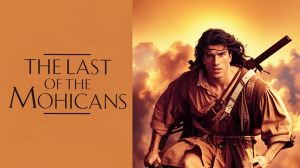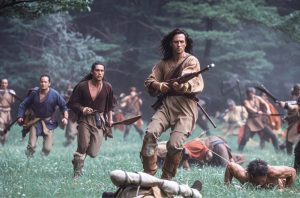The Last of the Mohicans (1992), directed by Michael Mann, is a sweeping historical drama set during the French and Indian War of 1757. The film follows Hawkeye (Daniel Day-Lewis), a white man raised by the Mohican tribe, as he becomes caught in the turbulent conflict between British and French forces in the American frontier. Alongside his adoptive father, Chingachgook (Russell Means), and brother, Uncas (Eric Schweig), Hawkeye aids Cora Munro (Madeleine Stowe) and her sister Alice (Jodhi May), the daughters of a British colonel, as they traverse treacherous landscapes while under pursuit by the vengeful Huron warrior Magua (Wes Studi).
The movie is both an action-packed adventure and a deeply emotional tale of love and survival. Hawkeye and Cora’s romance unfolds amidst the chaos of war, presenting a tender and poignant counterpoint to the brutality surrounding them. At the same time, the film explores the tragic fate of the Mohican tribe, highlighting the devastating effects of colonialism and the struggles of Native Americans to preserve their culture and way of life.

Visually, The Last of the Mohicans is a masterpiece, with breathtaking cinematography that captures the natural beauty of the American wilderness. The film’s authenticity is further enhanced by meticulous attention to historical details, from the costumes and weaponry to the depiction of 18th-century warfare. Complementing the visuals is the iconic score by Trevor Jones and Randy Edelman, whose music elevates the emotional intensity of the story, especially in its climactic moments.

Praised for its powerful performances, particularly Daniel Day-Lewis as the noble and determined Hawkeye and Wes Studi as the fearsome yet complex Magua, the film remains a beloved classic. The Last of the Mohicans combines epic storytelling with intimate human drama, making it a timeless exploration of love, loyalty, and the resilience of the human spirit amidst the turmoil of history.
